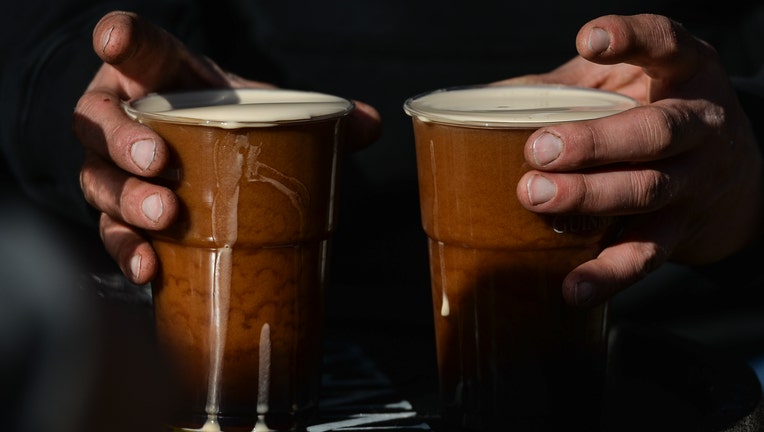Any amount of alcohol consumption can harm brain, according to UK study

A person collecting two pints of Guinness in a plastic cups from the pub in Dublin's city center.On Thursday, 13 May 2021, in Dublin, Ireland. (Photo by Artur Widak/NurPhoto via Getty Images)
LONDON - A new study from the United Kingdom found there is no safe level of alcohol consumption for the brain.
Several researchers in Oxford, England said more than 25,000 people took part in an observational study that involved a questionnaire and a cognitive test.
The study, which has yet to be peer-reviewed, said the more alcohol consumed, the lower the brain volume. Researchers pointed out that even moderate consumption had negative effects.
"No safe dose of alcohol for the brain was found," the study said. " Moderate consumption is associated with more widespread adverse effects on the brain than previously recognised."
RELATED: White Claw to launch hard seltzer with higher alcohol content
The study found that a higher volume of alcohol consumption per week was associated with lower grey matter density. Grey matter density positively correlates with a person’s abilities and skills. Alcohol explained up to 0.8% of grey matter volume lost. Researchers said while the number seems small, alcohol made a larger contribution than any other modifiable risk factor tested, including smoking.
Researchers found the problem is worse for people who suffer from high blood pressure and body mass index but said some of the brain damage could be reversed with abstinence.
Despite studies suggesting the benefits of wine drinking, the study said it found no evidence that different types of alcohol offered benefits.
However, the study does leave some unanswered questions. Researchers said it remains unclear the duration of drinking needed to cause an effect on the brain.
The study’s authors recommended health officials revisit "low-risk" drinking guidelines.
RELATED: California winery will pay $10,000 a month, provide free housing to work in Sonoma
"Current low risk guidelines do not take account of the brain impact of drinking but should now be reviewed," the study said.
"As a nation, our collective health would be better if people generally drank less," said Dr. Timothy Naimi, an alcohol researcher at Boston University and one of the experts on the committee convened by federal officials.
The advice was based on links that researchers observed between drinking habits and all causes of death, including heart disease, cancer and car accidents, rather than a specific physical harm that alcohol might have. Such observational studies, common in food and nutrition science, do not establish a cause-and-effect relationship but they are often the best evidence available, so experts use them to give guidance.
The Associated Press contributed to this report. This story was reported from Los Angeles.

